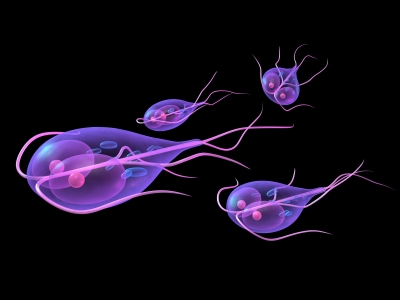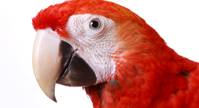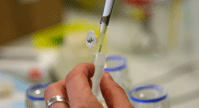Giardia Detection for Birds
ANIMAL GENETICS OFFERS PCR TESTING FOR GIARDIA IN BIRDS. DIFFERENT SPECIES OF GIARDIA AFFECT MANY OTHER ANIMALS INCLUDING HUMANS.
Description:

Giardia, a zoonotic, single-celled, intestinal protozoan parasite can cause disease in birds, dogs, cats, humans, and other animals. This parasite exists in two forms: trophozoite and cyst. Trophozoite is the active form which moves by means of hair-like structures known as flagella. These trophozoites use a small sucking disk to attach themselves to the surface of the villi (finger-like projections in the small intestines). The second, dormant form is called a cyst. Cysts as well as trophozoites are intermittently shed in the feces from an infected bird. The environmentally stable cysts that survive become a source of infection to other hosts. Trophozoites are unstable outside the host, presenting them with less of an opportunity to infect another host.
Although all birds are susceptible to Giardia infections, research has suggested that in Parrots and Parakeets, Cockatiels, Budgerigars, Lovebirds, and Grey-cheeked Parakeets might be more at risk of infection than other species of psittacines. This may, however, have more to do with the way these birds are generally housed than species susceptibility.
Transmission:
Transmission occurs when trophozoites and/or cysts are released in the feces of an infected bird. Asymptomatic birds may intermittently shed the cysts in their feces, serving as a continuous source of infection for other birds. Transmission occurs when these cysts and/or trophozoites are ingested from food or water and contaminate other possible hosts. Certain insects such as flies and cockroaches may serve as carriers of the cysts and transmit them from one location to another.
Note: Giardia from mammals may infect humans, but the zoonotic potential for avian giardiasis is thought to be low because it is believed that they are separate organisms.
Symptoms:
A Giardia infection in psittacine birds may be asymptomatic or the birds may exhibit signs of weight loss, bulky or loose foul-smelling stools, vomiting, diarrhoea, anorexia, depression and recurring yeast infections.
Giardiasis is a very frustrating disease, as it is virtually impossible to cure. However, Giardiosis can be controlled through medication and proper hygiene. Using water bottles helps prevent reunification. Feather picking associated with Giardia infection may resolve after treatment. However, this can return in time. This can be very frustrating and other methods may need to be employed to control the infection itself.
Diagnosis:
Diagnosis of Giardia in live birds is sometimes rather difficult. However, new technologies are expanding detection limits. Microscopic examination of fecal material, flotation tests, and trichome staining are general methods used for identification of trophozoites. Because of the intermittent shedding of the parasite, multiple samples must be examined before the bird can be considered uninfected.
New PCR and DNA sequence assays have been developed to detect parasitic DNA from both trophozoites and cysts. These assays are extremely sensitive and specific and are able to detect much lower levels of active or inactive parasite than previously possible.
Sample Type:
For PCR testing, samples from suspected birds are collected with fresh cloacal and fecal samples. For best results, multiple specimens collected over a period of time are recommended. Environmental samples can also be submitted to help evaluate possible contamination of the bird's surroundings.
Limitations:
As with any genetic test, new mutations may occur in the organism's genome that could affect the assay. Therefore, it may be difficult to detect new or different subtypes. Sample collection plays a pivotal part in the overall accuracy of the test, so please use caution and follow the instructions carefully.
Treatment:
Anitprotozoal drugs for Giardia treatment include Ipronidazole and Metronidazole. Re-treatment may be necessary because re-infection is fairly common. Consult your veterinarian about specific treatment options.
Submit a Sample For Testing:
To submit a sample download a test submission form at Downloads
Cost per sample is $24.50. Please see our fee schedules below for bulk and combination rates.










